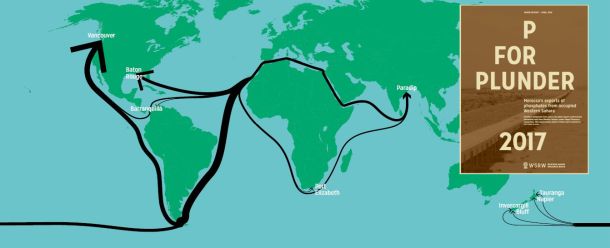
The US company FMC has stated that they have ended all Western Sahara imports, and that this also applies to its subsidiaries.
Photo above: Saharawis in Huelva, Southern Spain, protest against FMC's imports. FMC's imports of the controversial phosphate rock ended in 2010.
US company FMC Corp imported phosphate rock from occupied Western Sahara to Spain for a number of years, through its operations in Huelva. Equally, the company had part ownership of an importer in Venezuela that also purchased the phosphate rock for at least a decade. Through these 2 involvements, FMC Corp was one of the biggest purchasers of phosphate rock from the occupied territory of Western Sahara.
Western Sahara Resource Watch (WSRW) protested the trade, underlining it is in violation of international law, but neither FMC Corp nor its Venezuelan subsidiary replied to requests. However, the multinational has finally responded to a letter from a shareholder: FMC states it does not import any longer.
The Norwegian Ministry of Finances today announced that FMC has been removed from the black list of its government
pension fund. FMC was first excluded from the fund in December 2011 due to its imports from the territory. The Norwegian fund described FMC’s trade in the phosphate resource as "grossly unethical", since it was purchased from Morocco.
FMC quickly proceeded to state to the international media that it was surprised they were astonished about the move, and said that the company would “work with the Norway Wealth Fund officials to resolve this issue”.
However, FMC did not bother to answer requests from the same officials - nor concerned investors in other countries. WSRW knows that several investors internationally tried to obtain answers from FMC as to whether they still were in fact maintaining a business relationship with the Moroccan state phosphate company which operates in the territory.
“The [Norwegian Government Pension Fund’s] Council on Ethics wrote to the company on 12 December 2011, 3 May 2012 and 28 June 2012, asking whether it continues to purchase phosphate from Western Sahara”, the Council on Ethics wrote in a recommendation from August 2012 which was made public only today.
Finally, in a letter to the Council on Ethics, dated 9 August 2012, nine months after the company stated that it would be in dialogue with the investor, they finally responded.
According to the letter from FMC, neither FMC Corporation, FMC Foret nor any other subsidiary of FMC Corporation now purchases phosphate from any source, including Western Sahara. Furthermore, neither FMC Corporation nor its subsidiaries have any plans or agreements that include future purchases of phosphates from Western Sahara, according to the letter.
This must logically mean that the Venezuelan subsidiary of FMC Corp, Tripoliven, has stopped importing all kinds of phosphates - or that FMC Corp does not consider Tripoliven to be one of its subsidiaries. FMC remains as owner in Tripoliven, according to Tripoliven’s own webpage.
FMC Corp disappointed over Norway blacklisting
FMC Corporation states that they have stopped importing phosphates from Western Sahara to Spain and that they should never have been kicked out of the Norwegian government's pension fund for lack of ethics.
New report: Western Sahara phosphate trade halved
The export of phosphate rock from occupied Western Sahara has never been lower than in 2019. This is revealed in the new WSRW report P for Plunder, published today.
New report on Western Sahara phosphate industry out now
Morocco shipped 1.93 million tonnes of phosphate out of occupied Western Sahara in 2018, worth an estimated $164 million, new report shows. Here is all you need to know about the volume, values, vessels and clients.
New report on contentious Western Sahara phosphate trade
Morocco shipped over 1.5 million tonnes of phosphate out of occupied Western Sahara in 2017, to the tune of over $142 million. But the number of international importers of the contentious conflict mineral is waning, WSRW's annual report shows.



